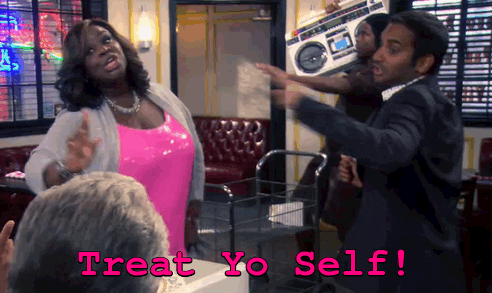Building Resilience through Care

Posted by Gabrielle Villar
October 22, 2019
We’re all familiar with self-care at this point. In popular culture, it’s become a great go-to excuse for indulging yourself, a la Parks & Rec style.

And for this reason, it’s also become co-opted by brands and commercialized. Brands use it as an excuse for you to buy their products or use their services. And we have to be careful because we are young and we are broke. But moreover, it’s not a sustainable way to take care of yourself. Self-care as we know it in activism is about resilience and the radical act of survival. We need to be able to engage with self-care in a way that can nurture us for as long as we need to continue our work. We can be distracted by ableist notions of working yourself to the bone for a cause, and while it may be productive, that road leads to burnout. So here are some reminders of self-care that can help us all remain resilient.
Examples of self-care:
Physical: Prioritizing sleep, drinking water, eating regularly and to satiety (feeling full), moving with purpose, breathing exercises.
Emotional: Keeping a journal, learning to say no, giving your energy to things that feed you, working with art or creative mediums, listening to music.
Mental: Taking time to clear your mind, meditation, taking time to learn more about what interests you or what will help you grow as a person.
Social: Nurturing your relationships with those who are significant in your life, finding regular time with friends,
Digital: Creating digital boundaries is a relatively new practice of self-care that is increasingly necessary. This can mean creating specific times throughout the day when you’re not looking at your phone or other technology, like during lunch or 30-60 minutes before bed. This is also a huge part of prioritizing sleep. Cultivating your timeline and social media to make sure that you’re not burning out simply by scrolling is another example. Digital self-care can also mean not clicking on pieces meant to just sensationalize and drive clicks.
These ideas can also be combined and remixed to become what you need and what feels right for you. An example might be trying something creative with friends. Dancing and singing along to a song can be very cathartic and provide emotional and physical self-care. I know for me, after a long day, singing a song out loud can bring me back from an empty social battery.
We also need to talk about a different kind of care. While self-care is about the resilience and survival of the individual, community care is about the resilience and survival of the community. It comes out of the healing justice movement, which has strong roots in the activism of women and femmes of color in the South. If you would like to learn more about healing justice and its connection to disability justice, here is a great article to get more familiar with it.
Healing justice in a nutshell came from the realization that in order to truly perform transformative justice in black and queer communities, organizers had to engage in healing from the traumas that can come from being marginalized, such as daily stresses, witnessing a distressing event through media or your community, or being the survivor of a distressing event. To heal from these traumas, we not only need to work on self-care, but go beyond and think about how we can work with our community and develop ways that we can recover and still function and eventually thrive.
There aren’t really any how-to guides for community care. Rather, it requires you to think creatively and intuitively about what you need to heal and what you can provide to help heal others. This can be holding space for others and their pain. Here are some outlines and resources from the Audre Lorde Project for inspiration.
Here are some organizations that are doing this kind of work:
- Creating Collective Access– From their website, they are a group building “community care, crip solidarity, and solidarity with non-crip comrades.”
- The Audre Lorde Project– They are a Lesbian, Gay, Bisexual, Two-Spirit, Trans and Gender Non-Conforming People of Color community organizing center based in New York.
- BEAM: Black Emotional and Mental Health Collective– They focus on developing community-based care for black people of all backgrounds to heal outside of harmful and isolating systems.
- Kindred Southern Healing Justice Collective– Started after the aftermath of Hurricane Katrina, they are comprised of healers and organizers in the southern United States.
This is not meant to be a comprehensive list, but simply a place to start looking. Self-care and community care are more important than ever, as we are being inundated with stress and trauma regularly, without much time to breathe and recover. We are also trying to do this work in an individualistic society. When we focus solely on self-care, we are recreating the systems that isolate us and reduce our power as a collective. To survive, we are going to need to overhaul how we think about care and how we organize.
For more about the importance of community care, check out this blog by Yashna Padamsee.
Leave a Reply
You must be logged in to post a comment.

